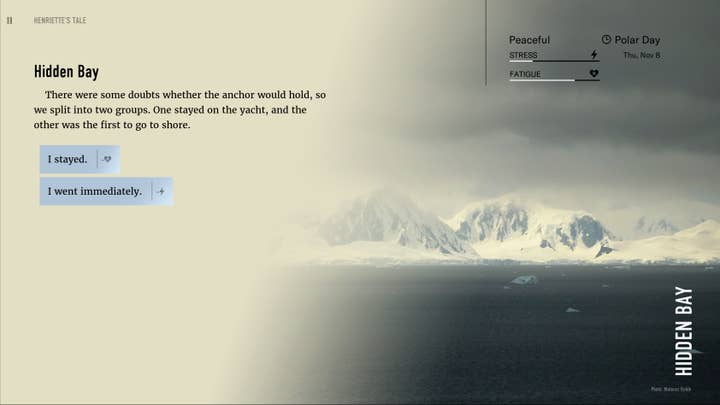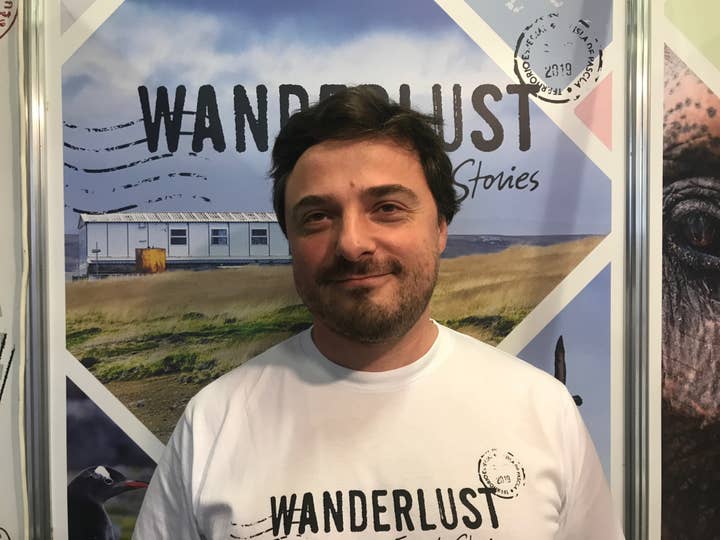The former Witcher developers making a mobile game about travel and humanity
Different Tales explains how its debut title Wanderlust: Travel Stories falls "halfway between literature and gaming"
Last year, Artur Ganszyniec and Jacek Brzeziński met between projects and discussed working on something together. The first project they had collaborated on was The Witcher (as lead story designer and head of production respectively). A lot had changed in the intervening years.
For one thing, their career paths had diverged. While Brzeziński continued to work on major titles like Hitman and Dying Light, Ganszyniec had moved into mobile. Their own tastes in games had shifted too, which drove much of the conversation.
"We started talking about games that are slower and more grounded in reality and common human experiences," Ganszyniec tells us. "We are sure the big entertainment games will be okay, but from time to time we need something more connected to the deep experiences we have.
"It's very risky, because you never know how many people are interested in games that are slower, but I think it will be okay."

Two things resulted from that discussion: the formation of a new studio, Different Tales, and its debut title, Wanderlust: Travel Stories.
Ganszyniec describes the latter as "halfway between literature and gaming." It's a narrative adventure presented with text and pictures (think 80 Days without steampunk) about people who have travelled the world. Five travellers gather in a bar on Easter Island and share their stories, with the player directing how they are told.
It's about 12 hours long -- "depending on how fast you read," says Ganszyniec -- and contains around 300,000 words -- "like the first and second Witcher combined." Most of the photos are from the developers' own travels, or those of their friends, plus others sourced from journalists and stock photography. One story has even been written around the experiences of a team member who sailed to Antartica last year.
Wanderlust was originally envisaged as "something like a simulator" but the team was keen not to bog players down with "the boring stuff you have to do when you travel." The focus was each traveller's feelings and experiences, efficiently conveyed via text and photos.
"It soon became apparent that we were making a book," laughs Ganszyniec. "But this is the way we want to go because it's the earliest narrative in the world: someone goes out there, comes back, and tells people what they saw, what happened to them, this is how the world looks."
The prospect of a 12-hour narrative game seems risky -- most titles in this vein are much shorter. Equally, the notion of reading a 300,000-word novel is something even the most avid readers might balk at. But Ganszyniec assures the pacing will be engaging, in part because the game is split into different stories.
"If we played by the rules and sold it for $6, it would be treated as just another visual novel. But the content, language, themes, the journalistic approach -- it's something different"
The longest is set in Thailand and takes about five hours, but Ganszyniec says this is "sort of open world" as it has a lot more choices and different ways players can direct the story. The shortest -- a tale of a man travelling from Poland to Barcelona by train for a date -- is about an hour.
The themes range from the discovery of new places, to accepting age and the passing of time. Different Tales hopes that by tapping into these common human experiences, it can reach a broader audience than the founders' previous projects. The fact that it's on mobile as well as PC and uses an intuitive book-like structure will certainly work in its favour -- although the price may be a barrier.
When we spoke at Gamescom, Ganszyniec said the studio was considering a $20 price point, but as it releases today, this has been revised to $9.99. This is still a little higher than many mobile games -- is the studio increasing the risk, given the historical difficulties of selling premium titles? Ganszyniec doesn't think so.
"The biggest business risk we are taking is that we are trying to reach outside the gaming market," he says. "[But] we've had a very good response from people who do not identify themselves as gamers. Like people who go to the theatre, go to opera, spend time on Netflix, and who like to read.
"This market is so crowded that if we played it by the rules and said, 'Okay, it's a text-based game so let's sell it for $6,' it would be treated as just another visual novel. But the content, the language, the themes, the journalistic approach -- it's something different. So we are trying to use every tool we have to communicate that this is something different."
Another major challenge Ganszyniec identifies is reaching out to non-gaming press. While Different Tales reports an enthusiastic response from its local Polish outlets, including the regional version of Vogue, pitching Wanderlust as "culture product" rather than a game to lifestyle journalists has been difficult. Fortunately, the text and pictures presentation means the game won't age, Ganszyniec says, so this is an effort the studio can continue long after launch.

Wanderlust is very different to the AAA titles the team has previously worked on, but Ganszyniec believes their experience in this area has been invaluable. The project has also helped address some of the shortcomings in bigger titles he has noted over the years, such as the extremes between binary choices.
"Some role-playing games are like you pet a cat or kick a cat," he says. "But it's not always about that. So something happens [in Wanderlust], and the choice the player has is sometimes 'I felt sad' or 'I felt motivated'. You start thinking as a player, 'How do I feel in such a situation? What is my reaction?'"
The mood players choose changes the way the story is told and the language used to describe their experiences. It means Wanderlust's five adventures can vary greatly, not only in event but in emotion, depending on how you direct the narration. They live up to the studio's name, telling tales that are different to most narratives found in video games.
"Most titles are based on frustration over common obstacles, triumph and maybe fear," Ganszyniec observes. "They are stories about someone physically overcoming obstacles and mastering skills. Those are the stories that most games tell. They are important stories, but I think that games can tell other stories about other feelings.
"To tell a story about longing, or sadness... you have to slow down. That is why we sort of made a book. There is no game over. You just shape the story. It's not for everyone because you have to like reading. But we are already thinking about what else can we do.
"We are watching the market because there are some stories and games that also have the slow element, like Heaven's Vault, Firewatch, Journey. I think Telling Lies or Her Story might be something like this. So there are some really good games that play the same notes, but I just want more."

